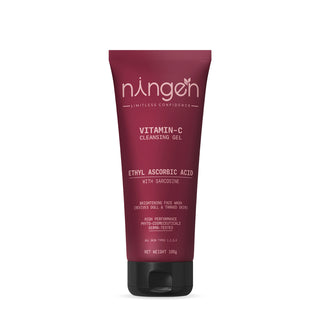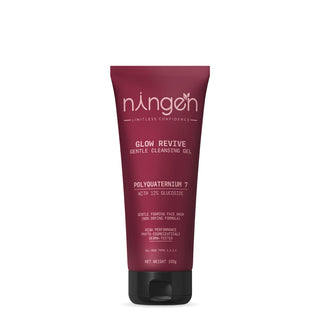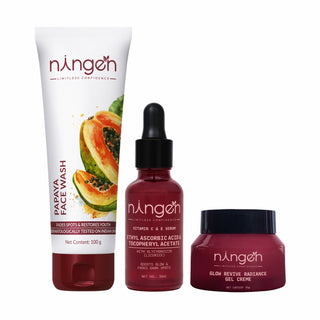When it comes to skincare, body lotion is a crucial component of nearly everyone’s routine, yet the abundance of options can be daunting. Whether you're coping with dry, flaky skin in winter or seeking a lightweight lotion for summer hydration, selecting the right body lotion is vital for achieving healthy, radiant skin. However, with various skin types & specific concerns, a one-size-fits-all approach often falls short. In this guide, we’ll assist you in exploring the body lotion landscape to discover the ideal product suited to your skin’s individual needs. No matter if your skin is dry, oily, sensitive, or something in between, there’s a perfect formula out there just waiting to enhance your skin’s natural beauty.
In This Article;
- Identifying Your Skin Type is Important
- Recognizing Dry Skin Characteristics
- Key ingredients for dry skin lotions
- Understanding Oily Skin Traits
- Key ingredients for oily skin lotions
- Identifying Combination Skin Features
- Key ingredients for combination skin lotions
- Recognizing Sensitive Skin Signs
- Key ingredients for sensitive skin lotions
- Check For Labels and Certifications
- Other Criteria For Choosing A Body Lotions
- pH Level
- Use Natural vs. Synthetic Ingredients
- Apply Body Lotion Even If You Have Oily Skin
- Avoid Potential Allergens
- The Bottom Line
- Quick View
- Frequently Asked Questions
Identifying Your Skin Type is Important
Before exploring the extensive range of body lotions, it's essential to identify and understand your specific skin type. Skin is typically classified as normal, dry, oily, combination, or sensitive, each with its own distinct characteristics and requirements. Recognizing your skin’s type enables you to choose the appropriate body lotion, the one that targets your specific concerns and improves your overall skin health.
Recognizing Dry Skin Characteristics
Dry skin is typically marked by insufficient moisture, leading to a rough, flaky texture. If your skin often feels tight, particularly after cleansing or during cold weather, you likely have dry skin. This skin type may also look dull and can exhibit signs of cracking or peeling. To keep dry skin well-hydrated, seek out body lotions containing key ingredients like hyaluronic acid, which helps retain moisture in the skin, or shea butter, which supports the skin barrier.
Key ingredients for dry skin lotions
For dry skin, which is often rough, flaky, and occasionally itchy, seek out lotions that feature key ingredients such as:
- Hyaluronic acid: Boosts the skin's water content and minimizes moisture loss.
- Shea butter: Offers nourishment to your skin through fatty acids & vitamins.
- Glycerin: Works as a humectant, by attracting moisture into the skin.
- Urea: Helps in exfoliation of dead skin cells and retaining moisture.
- Ceramides: Essential lipids, which help in strengthening the skin's natural protective barrier.
Understanding Oily Skin Traits
Oily skin is characterized by overproduction of sebum, which results in a shiny complexion & a tendency for acne. If you experience excess shine, enlarged pores, or a greasy sensation during the day, you probably have oily skin. For people with this skin type, it’s important to go for a body lotion that’s lightweight and non-comedogenic. Look for formulations containing ingredients like Salicylic Acid to help remove dead skin cells and manage excess sebum without stripping the skin of its natural protective barrier.
Key ingredients for oily skin lotions
Oily skin produces sebum in abundant quantity, contributing to a shiny complexion & acne. Moisturizers designed for oily skin should include ingredients that hydrate while minimizing oiliness, such as:
- Salicylic acid: Exfoliates your skin & unclogs pores to help reduce breakouts.
- Niacinamide: Controls excess sebum production and improves skin tone.
- Hyaluronic acid: Offers hydration without adding greasiness.
- Witch hazel: Works as an astringent for tightening the skin and removing excess oils.
Identifying Combination Skin Features
Combination skin features varying skin types across different areas of the body. Typically, you will be able to notice signs of oily skin in the T-zone, while the cheeks and other regions may be dry or normal. Recognizing this skin type involves noting the differences in oil production and dryness across various areas. A balancing body lotion, ideally containing both hyaluronic acid to hydrate the dry areas and ingredients like glycolic acid to help reduce oiliness, can be advantageous for this skin type.

Key ingredients for combination skin lotions
Combination skin involves managing both oily as well as dry areas, necessitating versatile ingredients that can tackle both concerns at once:
- Lactic acid: Gently exfoliates to smooth dry patches without over-drying the oily zones.
- Jojoba oil: Mimics the functioning of your skin's natural oils, and delivers moisture without clogging pores.
- Green tea extract: Provides antioxidant protection and helps control oil production in the T-zone.
- Hyaluronic acid: Offers hydration where needed without worsening oily areas.
Recognizing Sensitive Skin Signs
Sensitive skin is typically reactive, easily becoming red, irritated, or itchy when exposed to specific ingredients or environmental triggers. If your skin frequently develops rashes, spots, or irritation from skincare products, you may have sensitive skin. Managing this type involves using hypoallergenic body lotions that are free from fragrances and harsh chemicals. Seek out soothing ingredients like aloe vera and components specifically formulated to strengthen the skin barrier while calming irritation.
Key ingredients for sensitive skin lotions
Sensitive skin can be easily irritated and may strongly react to common ingredients. Therefore, it’s essential to pick formulas with mild components:
- Aloe vera: Well-known for its soothing & anti-inflammatory properties.
- Allantoin: Helps in soothing irritated skin and stimulating cell regeneration.
- Oatmeal: Naturally calms inflammation and relieves itching.
- Bisabolol: An active compound in chamomile that calms irritation and reduces redness.
- Fragrance-free and alcohol-free formulations: These minimize potential irritants that can upset sensitive skin.
Also read: How to determine your skin type?
Check For Labels and Certifications
Here are some central points for you to keep in mind:
- Hypoallergenic: Indicates that the product is lesser likely to trigger allergic reactions.
- Non-comedogenic: Indicates that the lotion is formulated not to clog pores, making it suitable for acne-prone or oily skin types.
- Dermatologist-tested: Signifies that the product has been evaluated by skin experts, although specific testing details may not always be available.
- Cruelty-Free and Vegan: These certifications confirm that no animal testing was conducted in the product's development, while vegan means it contains no animal-derived ingredients.
- Organic and Natural: These suggest that the ingredients were sourced without synthetic pesticides and fertilizers. However, it's important to look for legitimate certifications like USDA Organic or EcoCert, as these terms are not strictly regulated without them.
Also read: How to make your skin smoother?
Other Criteria For Choosing A Body Lotions
pH Level
The pH level of your body lotion plays a vital role in maintaining your skin’s protective barrier. A compromised skin barrier can lead to dryness, irritation, and conditions like eczema. Ideally, skincare products should have a pH of around 5.5, which aligns with your skin's natural acidity. This helps prevent the growth of harmful bacteria while keeping your skin hydrated. When selecting a lotion, especially if your skin is sensitive or irritated, look for 'pH-balanced' labels.
Use Natural vs. Synthetic Ingredients
Body lotions that feature natural ingredients, such as aloe vera and coconut oil, are known for their soothing and moisturizing qualities. On the other hand, synthetic ingredients like peptides and retinol provide powerful anti-aging benefits. While natural ingredients may be perceived as gentler, they can still trigger reactions, and many synthetic ingredients are rigorously tested for safety. The best approach is to evaluate your skin’s sensitivities, the quality of the ingredients, and your specific needs when deciding between natural and synthetic options.

Apply Body Lotion Even If You Have Oily Skin
Those with oily skin often skip body lotion, fearing it will increase greasiness. However, oily skin also requires moisture, particularly during certain seasons. Cold winter air and indoor heating can strip moisture, while summer sun, heat, and chlorine can dry out skin. Choose lightweight, oil-free, or gel-based lotions designed for oily skin to provide hydration without clogging pores or leaving a greasy residue. Keeping a proper moisture balance is essential year-round for healthy, soft skin.
Avoid Potential Allergens
When searching for the ideal body lotion, it’s important to avoid allergens that could trigger reactions like redness, itching, or rashes. Common allergens include:
- Fragrances: Often added for pleasant scents, they are frequent culprits of allergic contact dermatitis.
- Essential Oils: While natural, they can sensitize skin or cause allergic reactions in some
- individuals.
- Lanolin: Derived from sheep’s wool, it can lead to contact allergies for some people.
The Bottom Line
Selecting the right body lotion for your skin type is crucial for maintaining healthy, balanced skin. Whether your skin is dry, oily, sensitive, or a combination, understanding your unique needs will help you choose products with the most effective ingredients. Pay attention to labels, pH levels, and the nature of the ingredients, and remember to moisturize even if you have oily skin. With the right knowledge, finding the perfect lotion becomes simpler and focused on nourishing your skin.
Quick View:
Choosing the right body lotion depends on your skin type—dry, oily, combination, or sensitive. Use hydrating ingredients for dry skin, oil-controlling formulas for oily skin, and hypoallergenic products for sensitive skin. Balance natural and synthetic ingredients based on your skin’s needs. Don't skip lotion, even if you have oily skin; proper hydration is key to healthy skin.
Frequently Asked Questions
Q1: How can I find the best body lotions in the market for my dry skin?
Look for lotions with hydrating ingredients like shea butter, hyaluronic acid, and ceramides to lock in moisture and repair the skin barrier.
Q2: Can I use body lotion without any worries if I have oily skin?
Yes, oily skin still needs moisture. Choose lightweight, gel-based, or non-comedogenic, lotions that hydrate without clogging pores.
Q3: What are the best ingredients for sensitive skin?
Aloe vera, oatmeal, allantoin, and fragrance-free formulations are ideal for soothing and protecting sensitive skin.
Q4: How can I tell if a body lotion is pH-balanced?
Look for 'pH-balanced' claims on the label. A pH of around 5.5 is ideal for maintaining your skin’s natural acidity and barrier function.
Q5: What are common allergens in body lotions?
Fragrances, essential oils, and lanolin are common allergens that can provoke skin reactions in sensitive individuals.
Q6: What should I avoid in body lotions for sensitive skin?
Steer clear of harsh chemicals, synthetic fragrances, alcohol, and certain essential oils that may irritate sensitive skin.
Q7: Are natural ingredients always better than synthetic ones?
Not necessarily. Natural ingredients can still cause some allergic reactions, and many synthetic ingredients are being test rigorously for safety and effectiveness.
Q8: Should I use different types of body lotions for different seasons?
Yes, in winter, opt for richer creams to combat dryness; in summer, choose lighter, oil-free lotions to stay hydrated without feeling greasy.
Q9: Is it safe to use body lotion on my face?
Body lotions can be too heavy for your delicate facial skin. It's better to use products specifically designed for the face to avoid clogging pores.
Q10: How often should I apply body lotion?
Apply Body lotion daily, ideally after having a shower when your skin is still damp, you can lock in moisture and keep your skin soft and hydrated.











